Premium Only Content
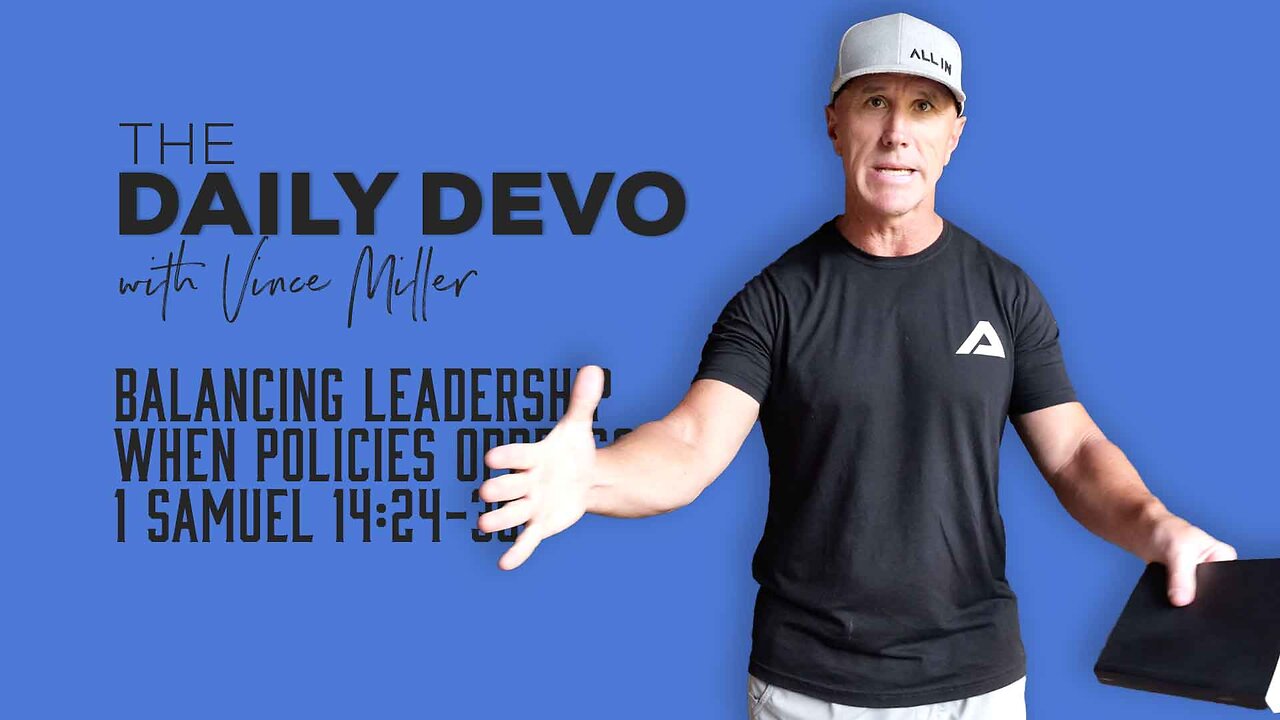
Balancing Leadership When Policies Oppress | 1 Samuel 14:24-30
Are their policies and procedures oppressing you?
Welcome to the Daily Devo. I am Vince Miller.
This week, we are in 1 Samuel 14. I've titled this chapter "A Contrast Of Leadership Between Jonathan and Saul."
This latter section of Chapter 14 is going to illustrate a sharp contrast between Jonathan and Saul, and a lot of this stems from the very next thing Saul does in verse 24:
And the men of Israel had been hard pressed that day, so Saul had laid an oath on the people, saying, “Cursed be the man who eats food until it is evening and I am avenged on my enemies.” So none of the people had tasted food.— 1 Samuel 14:24
Just to be clear, nothing in the Bible substantiates or supports the need for a vow like this. This was something conceived only by Saul. It also appears to be self-motivated, as insinuated by the phrase "my enemies." This misunderstanding leads to a great contrast in leadership between Saul and Jonathan. Jonathan perceived the battle to belong to the Lord, and Saul perceived it to be his battle with his enemies, a misunderstanding that would continue throughout his 40-year reign.
The irony of Saul's vow is that it pressed the people harder than the battle itself. Let's read down from verses 25-30 to see how this played out.
Now when all the people came to the forest, behold, there was honey on the ground. And when the people entered the forest, behold, the honey was dropping, but no one put his hand to his mouth, for the people feared the oath. But Jonathan had not heard his father charge the people with the oath, so he put out the tip of the staff that was in his hand and dipped it in the honeycomb and put his hand to his mouth, and his eyes became bright. Then one of the people said, “Your father strictly charged the people with an oath, saying, ‘Cursed be the man who eats food this day.’” And the people were faint. Then Jonathan said, “My father has troubled the land. See how my eyes have become bright because I tasted a little of this honey. How much better if the people had eaten freely today of the spoil of their enemies that they found. For now the defeat among the Philistines has not been great.” — 1 Samuel 14:25-30
As we will see by the time we get to the end of the chapter, this honey was merely God's provision. The problem is that Saul has forbidden it. But Jonathan did not know it because he was absent when the vow was given. So Jonathan stabs his staff into it and eats. Once he finds out about his father's vow, he points out how stupid and oppressive the vow is for finishing the work of the Lord.
Leadership is always challenging, but oppressive policies do not make it less of a challenge for anyone. I have seen this happen so many times. As organizations grow, so do politics, policies, and procedures. But sometimes, these policies restrict the freedom needed to accomplish the mission. They might even be self-defeated. In this case, Saul's policy was born out of his need for self-preservation, and it defeated the troops. In the coming text, we will see how his policy led his people to sin.
As a leader, I always feel this tension in my family, workplace, and personal life. I debate in each instance and with each person how to offer freedom to lead and provide appropriate boundaries that prohibit sin and organizational failure. In each instance, it is different. It has been different with every one of my children, and it changed as they aged. Each staff member has been different and changed at various stages of development. But it's not only their age and stage that I have to keep my eyes on. It's the motivation of my heart as I establish these boundaries. If I am not careful, I can be selfish and oppressive and develop policies and procedures that become oppressive because I am only looking out for myself, which can lead me and them into sin rather than toward God's salvation.
That's the issue in this text. Jonathan had led the people into salvation, and Saul was leading them into sin.
Don't lead the people you lead into sin. Instead, walk the leadership balance carefully by paying attention to your motivation today. And if you need to change how you parent and lead, do it.
#LeadershipLessons, #AvoidingOppression, #WisdomInLeadership
Ask This:
How have you experienced or observed policies or decisions in your own life that seemed to prioritize personal agendas over the well-being of the group? How did that impact your perspective on leadership?
In what areas of your life—whether at work, in your family, or within your community—might you be setting rules or boundaries that are more about self-preservation than genuine growth and freedom? How can you adjust your approach to better align with God’s principles of leadership and service?
Do This:
Balance your leadership and stop oppressing the people you lead.
Pray This:
Lord, help me recognize and confront any policies or decisions in my leadership that may be driven by selfish motives rather than Your guidance. Grant me wisdom to lead with integrity and to create an environment that fosters growth and freedom in alignment with Your will. Amen.
Play This:
Freedom.
-
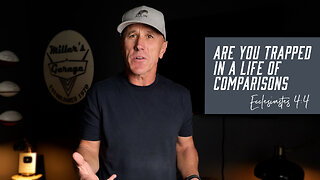 3:14
3:14
Through the Bible with Vince Miller
9 days ago $0.01 earnedThe Comparison Trap: Why It’s Stealing Your Joy | Ecclesiastes 4:4
441 -
 LIVE
LIVE
BonginoReport
3 hours agoState of the Union Breakdown: Democrats' Disastrous Decorum (Ep.153) - 03/05/2025
18,423 watching -
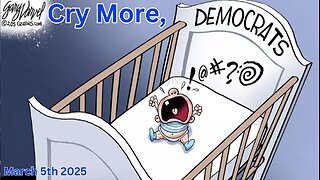 LIVE
LIVE
Wendy Bell Radio
4 hours agoCry More, Democrats
12,798 watching -
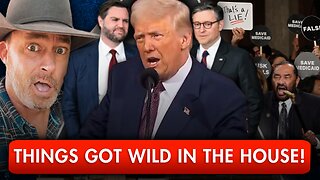 LIVE
LIVE
Dear America
9 hours agoTrump DOESN'T HOLD BACK In Speech To Congress FULL RECAP!
6,310 watching -
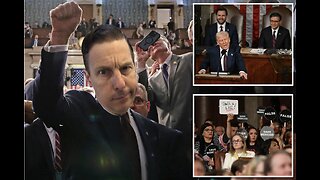 LIVE
LIVE
Jeff Ahern
58 minutes agoNever Woke Wednesday with Jeff Ahern (big time speech)
657 watching -
 39:10
39:10
Producer Michael
18 hours agoINSIDE AN INSANE MIAMI SUPERCAR COLLECTION!
14.6K3 -
![Dems Proved They Hate America & Angry They Can’t Lord Over All Americans [EP 4461-8AM]](https://1a-1791.com/video/fwe2/9c/s8/1/0/2/G/p/02Gpy.0kob-small-Dems-Proved-They-Hate-Ameri.jpg) LIVE
LIVE
The Pete Santilli Show
10 hours agoDems Proved They Hate America & Angry They Can’t Lord Over All Americans [EP 4461-8AM]
1,989 watching -
 12:32
12:32
Melonie Mac
20 hours agoAmouranth 2A's Intruder
14.7K26 -
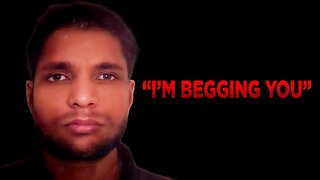 16:39
16:39
Scammer Payback
15 hours agoNo Mercy for this Scammer
12.6K12 -
 31:19
31:19
Uncommon Sense In Current Times
16 hours ago $2.66 earned"The Truth About Government Waste: How USAID is Failing & What Christians Must Do w/ Cheryl Chumley"
12.7K4